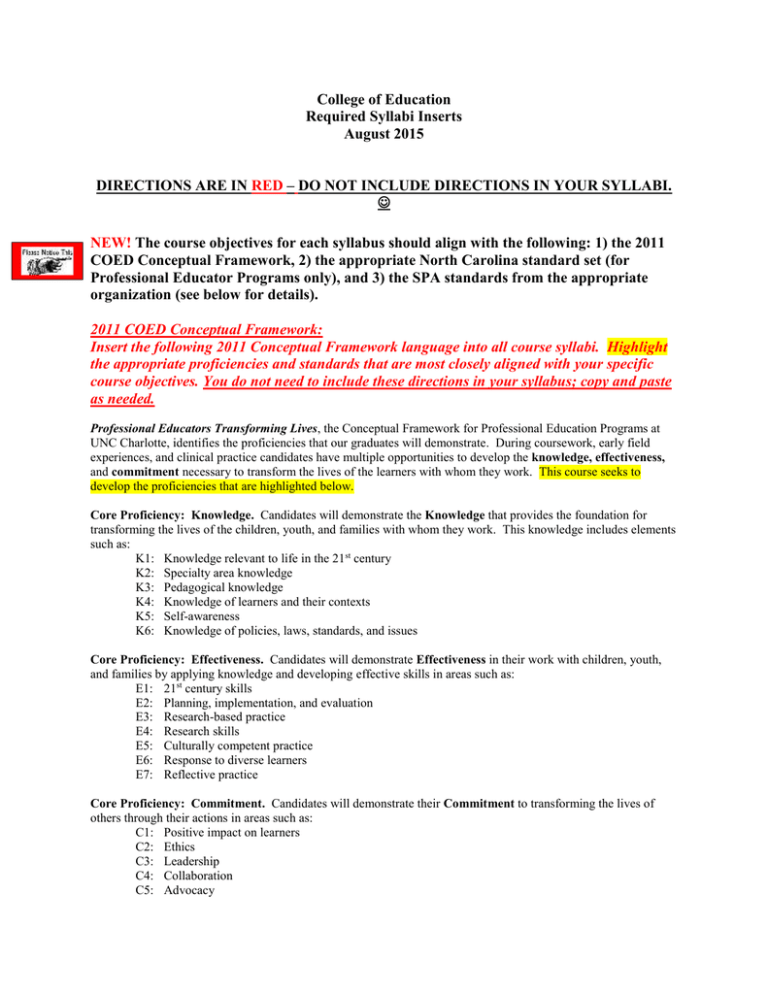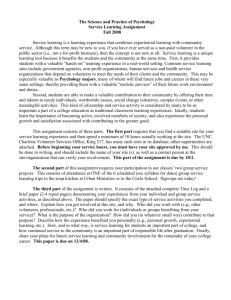COED Required Course Syllabi Inserts
advertisement

College of Education Required Syllabi Inserts August 2015 DIRECTIONS ARE IN RED – DO NOT INCLUDE DIRECTIONS IN YOUR SYLLABI. NEW! The course objectives for each syllabus should align with the following: 1) the 2011 COED Conceptual Framework, 2) the appropriate North Carolina standard set (for Professional Educator Programs only), and 3) the SPA standards from the appropriate organization (see below for details). 2011 COED Conceptual Framework: Insert the following 2011 Conceptual Framework language into all course syllabi. Highlight the appropriate proficiencies and standards that are most closely aligned with your specific course objectives. You do not need to include these directions in your syllabus; copy and paste as needed. Professional Educators Transforming Lives, the Conceptual Framework for Professional Education Programs at UNC Charlotte, identifies the proficiencies that our graduates will demonstrate. During coursework, early field experiences, and clinical practice candidates have multiple opportunities to develop the knowledge, effectiveness, and commitment necessary to transform the lives of the learners with whom they work. This course seeks to develop the proficiencies that are highlighted below. Core Proficiency: Knowledge. Candidates will demonstrate the Knowledge that provides the foundation for transforming the lives of the children, youth, and families with whom they work. This knowledge includes elements such as: K1: Knowledge relevant to life in the 21st century K2: Specialty area knowledge K3: Pedagogical knowledge K4: Knowledge of learners and their contexts K5: Self-awareness K6: Knowledge of policies, laws, standards, and issues Core Proficiency: Effectiveness. Candidates will demonstrate Effectiveness in their work with children, youth, and families by applying knowledge and developing effective skills in areas such as: E1: 21st century skills E2: Planning, implementation, and evaluation E3: Research-based practice E4: Research skills E5: Culturally competent practice E6: Response to diverse learners E7: Reflective practice Core Proficiency: Commitment. Candidates will demonstrate their Commitment to transforming the lives of others through their actions in areas such as: C1: Positive impact on learners C2: Ethics C3: Leadership C4: Collaboration C5: Advocacy C6: Professional identity and continuous growth North Carolina Standards (for Education Preparation Programs only): The core proficiencies of knowledge, effectiveness, and commitment are fully aligned with the North Carolina standards for teachers, school executives, and counselors. This course seeks to develop the North Carolina standards that are indicated below. Select the appropriate set of standards and delete the others. North Carolina Professional Teaching Standards (2007): 1) Demonstrate leadership, 2) Establish a respectful environment for a diverse population of students, 3) Know the content they teach, 4) Facilitate learning for their students, 5) Reflect on their practice. North Carolina Standards for Graduate Teacher Candidates (2009): 1) Teacher leadership, 2) Respectful educational environments, 3) Content and curriculum expertise, 4) Student learning, 5) Reflection North Carolina Standards for School Executives (2006): 1) Strategic leadership, 2) Instructional leadership, 3) Cultural leadership, 4) Human resource leadership, 5) Managerial leadership, 6) External development leadership, 7) Micropolitical leadership. North Carolina Professional School Counseling Standards (2008): 1) Demonstrate leadership, advocacy, and collaboration; 2) Promote a respectful environment for a diverse population of students; 3) Understand and facilitate the implementation of a comprehensive school counseling program; 4) Promote learning for all students; 5) Actively reflect on their practice. _____________________________________________________________________________________________ Specialized Professional Association (SPA) standards: Only include appropriate standards from your organization and course. http://pr ovost.u ncc.edu /policies /acade mic/with drawals http://pr ovost.u ncc.edu /policies /acade mic/with drawals NEW! Each program should align their course syllabi to include the Specialized Professional Association (SPA) Standards for their content area organization (e.g., Council for Exceptional Children, Association for Middle Level Education, National Council for Teachers of English, etc.). _____________________________________________________________________________ The Legal Department offers other examples of possible policies to include in your syllabus. These examples are available at http://legal.uncc.edu/legal-topics/classroom-policies-andpractices/suggested-standard-syllabus-policies Code of Student Academic Integrity All students are required to read and abide by the Code of Student Academic Integrity. Violations of the Code of Student Academic Integrity, including plagiarism, will result in disciplinary action as provided in the Code. Definitions and examples of plagiarism are set forth in the Code. The Code is available from the Dean of Students Office or online at: http://legal.uncc.edu/policies/up-407 Faculty may ask students to produce identification at examinations and may require students to demonstrate that graded assignments completed outside of class are their own work. College of Education Diversity Commitment The College of Education at UNC Charlotte is committed to social justice and respect for all individuals, and it seeks to create a culture of inclusion that actively supports all who live, work, and serve in a diverse nation and world. Attaining justice and respect involves all members of our community in recognizing that multi-dimensional diversity contributes to the College’s learning environments, thereby enriching the community and improving opportunities for human understanding. While the term “diversity” is often used to refer to differences, the College’s intention is for inclusiveness, an inclusiveness of individuals who are diverse in ability/disability, age, economic status, ethnicity, gender, language, national origin, race, religion, and sexual orientation. Therefore, the College aspires to become a more diverse community in order to extend its enriching benefits to all participants. An essential feature of our community is an environment that supports exploration, learning, and work free from bias and harassment, thereby improving the growth and development of each member of the community. College of Education Technology Statement Professional education programs at UNC Charlotte are committed to preparing candidates for success in the 21 st century through an emphasis on knowledge, effectiveness and commitment to technology integration and application. Preparation in the integration and application of technology to enhance student learning is essential for all candidates. Programs across the professional education unit, including the College of Arts + Architecture, College of Education, and College of Liberal Arts and Sciences, reflect this commitment in coursework, early field experiences, and clinical practice which includes student teaching and/or the capstone/internship phase of the respective programs. Religious Accommodations UNC Charlotte provides reasonable accommodations, including a minimum of two excused absences each academic year, for religious observances required by a student’s religious practice or belief. Such reasonable accommodations must be requested in accordance with the procedures in this Policy, and include the opportunity for the student to make up any tests or other work missed due to an excused absence for a religious observance. Students wishing to request a religious accommodation may refer to the information found at http://legal.uncc.edu/policies/up-409. It is the obligation of students to provide faculty with reasonable notice of the dates of religious observances on which they will be absent by submitting a Request for Religious Accommodation Form to their instructor prior to the census date for enrollment for a given semester (typically the 10th day of enrollment). Disability Accommodations – UPDATED JANUARY 2015 UNC Charlotte is committed to access to education. If you have a disability and need academic accommodations, please provide a letter of accommodation from Disability Services early in the semester. For more information on accommodations, contact the Office of Disability Services at 704-687-0040 or visit their office at Fretwell 230. All information shared with the instructor concerning a disability will remain strictly confidential unless otherwise specified by the instructor. Online Student Course Evaluation Process and Confidentiality Courses in the College of Education are evaluated through an online evaluation survey process. Student course evaluations provide an important source of feedback for faculty regarding course design and instructional effectiveness. The online course evaluations are administered at the end of the term, during the final two week (prior to final exams). You will receive an email announcement alerting you when the survey period opens. Periodic reminders will be sent during the time the survey is open. Please be advised that this process is secure and confidential. The technology used ensures anonymity of participants as well as confidentiality. The College of Education is committed to excellent instruction and student support. Please help in continuing this commitment by participating in the course evaluation process. Credit Hour Statement (edit this as needed) This [NUMBER OF CREDIT HOURS FOR COURSE]-credit course requires [NUMBER OF CREDIT HOURS FOR COURSE] hours of classroom or direct faculty instruction and [NUMBER OF CREDIT HOURS FOR COURSE X 2] hours of out-of-class student work each week for approximately 15 weeks. Out-of-class work may include but is not limited to: [REQUIRED READING, LIBRARY RESEARCH, STUDIO WORK, PRACTICA, INTERNSHIPS, WRITTEN ASSIGNMENTS, AND STUDYING FOR QUIZZES AND EXAMS]. EXAMPLE: 1 CREDIT COURSE “This 1-credit course requires one hour of classroom or direct faculty instruction and two hours of out-ofclass student work each week for approximately 15 weeks. Out-of-class work may include but is not limited to: required reading, library research, written assignments, and studying for quizzes and exams.” Choose ONE of the following to include in your syllabus: thdrawa Professional Dispositions for Professional Education Programs ls Dispositions include the values, commitments, and ethics expected of professional educators and will be evaluated throughout your academic and professional preparation. (These may be found online at https://education.uncc.edu/resources/professional-dispositions-plan-and-information). Education is a demanding profession that requires candidates to act in a professional manner at all times, be collegial with peers and supervisors, and conscientiously attend to job-related details. Showing proper initiative and following through on tasks in a timely manner are also critical. Establishing habits supportive of these dispositions is an important part of each candidate’s career preparation and as such will be emphasized throughout this course and the program. OR Professional Dispositions for Professional Counseling Programs Dispositions include the values, commitments, and ethics expected of professional counselors and will be evaluated throughout your academic and professional preparation. (These may be found online at https://education.uncc.edu/resources/professional-dispositions-plan-and-information). Counseling is a demanding profession that requires candidates to act in a professional manner at all times, be collegial with peers and supervisors, and conscientiously attend to job-related details. Showing proper initiative and following through on tasks in a timely manner are also critical. Establishing habits supportive of these dispositions is an important part of each candidate’s career preparation and as such will be emphasized throughout this course and the program. REQUIRED FOR UNDERGRADUATE COURSES ONLY University Policy on Withdrawals (for undergraduate students only) Students are expected to complete all courses for which they are registered at the close of the add/drop period. If students are concerned about succeeding in the course, it is important to make an appointment to speak with the course instructor as soon as possible. The University policy on withdrawal allows students only a limited number of opportunities available to withdraw from courses. Undergraduate students may receive a grade of W for no more than 16 credit hours over their academic careers. It is important for students to understand the financial and academic consequences that may result from course withdrawals. The UNC Charlotte Academy Policy on Withdrawals for Undergraduate students is available from the Office of the Provost or online at: http://provost.uncc.edu/policies/academic/withdrawals OPTIONAL SYLLABUS INSERT for courses featuring edTPA practice pieces /acade mic/with drawals edTPA Practice Pieces prior to Student Teaching edTPA, formerly the Teacher Performance Assessment, was designed by teachers and teacher educators to support candidate learning and provide data that support preparation program growth and renewal. Aligned with Common Core State Standards and InTASC standards, edTPA assesses teaching behaviors that focus on student learning. It is a research-based, performance-based assessment currently used nationwide. The final edTPA product will be skills assessed by edTPA will be provided in program coursework. In this course, practice for [INSERT AS APPROPRIATE: TASK 1 PLANNING / TASK 2 INSTRUCTION / TASK 3 ASSESSMENT] will be provided to help candidates prepare for completing edTPA during the student teaching semester.


